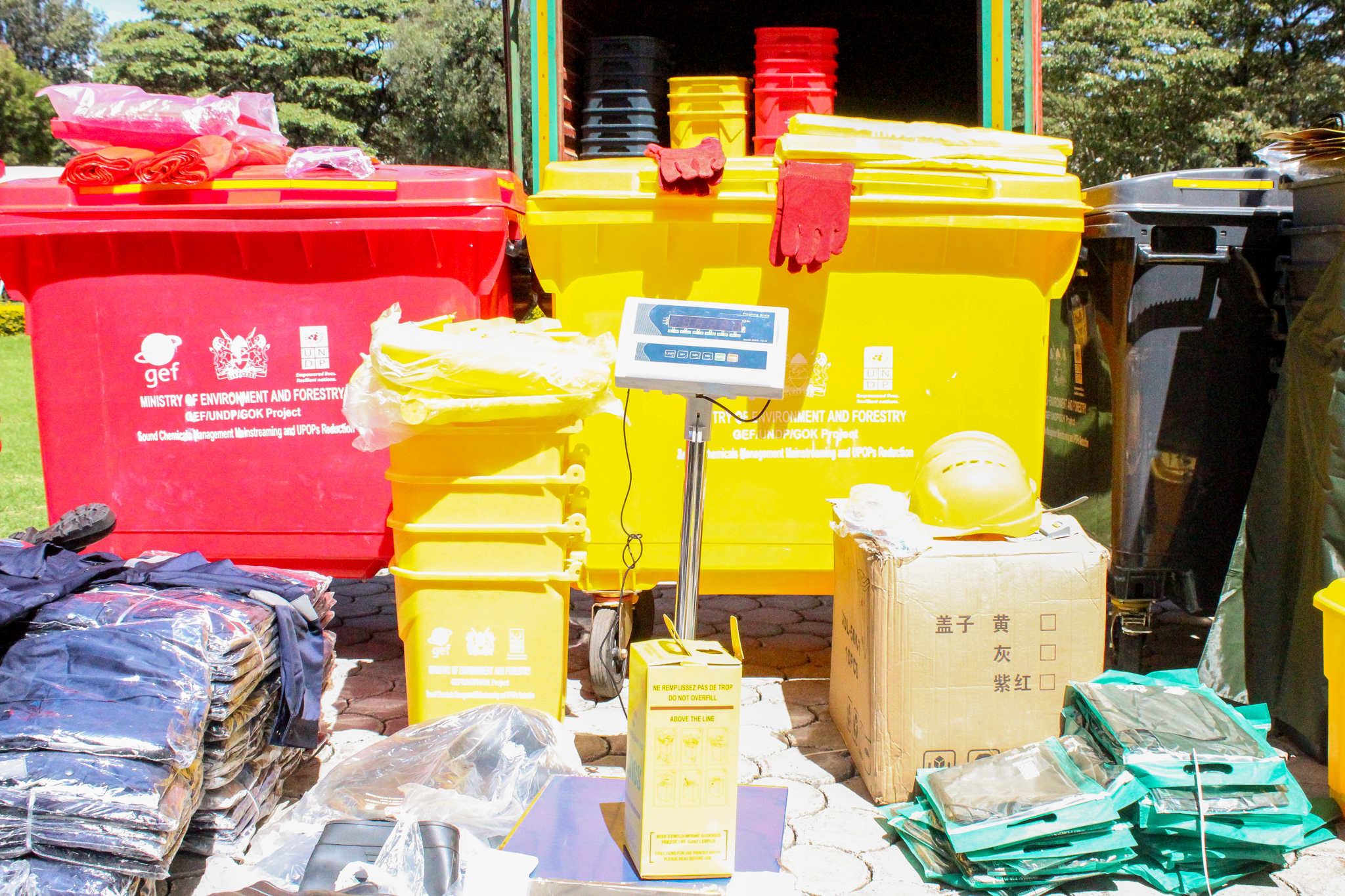HE Governor Kinyanjui speaks in front of representatives from the Government of Kenya, County Government of Nakuru, UNDP, and hospital administration at the handover of Medical Waste Management equipment from UNDP to the Rift Valley Provincial General Hospital, Nakuru County. Photo: Washington Ayiemba/UNDP Kenya.
Building on going support aimed at strengthening county-level capacity to efficiently and sustainably manage medical waste as part of the national response to the COVID-19 pandemic, UNDP joined partners from the Government of Kenya and County Government of Nakuru at Rift Valley Provincial General Hospital, Nakuru County, to handover Medical Waste Management equipment procured by UNDP.
The specialist equipment, handed over on 21 May 2020, is to be deployed in Nakuru County at the Rift Valley Provincial General Hospital, Naivasha Sub-County Hospital, and Molo Sub-County Hospital. Intended to bolster the Medical Waste Management response from initial triage to final disposal, the equipment is designed to reduce volume of waste disposed through the non-burn technology process and has been procured in line with WHO Blue Book guidance on Best Available Techniques (BAT) and Best Environmental Practice (BEP).
The handover in Nakuru County marks full operationalization of this initiative nationally, and follows the first handover of similar equipment by UNDP which took place on 23 April 2020 at Mbagathi Hospital, Nairobi County. In total, over USD $100,000 worth of specialist equipment has been procured by UNDP for use in the Kenyan healthcare system, including over 450 colour-coded waste receptacles and over 1,000 sets of personal protective equipment (PPE) to be used at 13 pilot health centres across 4 counties (Kisumu, Nairobi, Nakuru and Mombasa).
The specialist medical waste management equipment handed over by UNDP included colour-coded waste receptacles, wastebin liners, weighing scales, trolleys and personal protective equipment (PPE). Photo: Washington Ayiemba/UNDP Kenya.
UNDP Resident Representative Mr. Walid Badawi joined HE the Governor of Nakuru County Mr. Lee Kinyanjui, PS Ms. Susan Mochache of the Ministry of Health, PS Dr. Chris Kiptoo of the Ministry of Environment and Forestry, and key representatives from the County Government, ministries and hospital administration at Rift Valley Provincial General Hospital to mark the handover. Mr. Badawi paid tribute to the Government of Kenya’s “robust” efforts to tackle the COVID-19 pandemic through the COVID-19 Coordinating Committee and the National Response Plan, and reaffirmed the UN’s supporting role in this response.
“I wish to reiterate UNDP’s, and indeed the entire UN family’s, commitment to this partnership with the Government to ensure Kenya emerges victorious and defeats this deadly menace,” said Mr. Badawi.
HE Governor Kinyanjui noted that the equipment would add to Nakuru’s capacity to manage the increased levels of medical waste that the County has seen during the COVID-19 pandemic, with up to an estimated 600,000 single-use face masks disposed of daily. Also on discussion at the handover was the topic of the circular economy: HE Governor Kinyagui posited that through innovative waste management practices, livelihoods and employment opportunities could be created in Nakuru County, especially for the youth.
Closing the event, PS Kiptoo recognized the partnership between the Ministry of Environment and Forestry, the Ministry of Health and UNDP in promoting sustainable medical waste management practices, and highlighted capacity-building activities conducted over the past year as a key intervention to bolster Kenya’s COVID-19 response.
“Training would have not come at a better time than this, and even as we struggle to reach out to counties with COVID-19 trainings on waste handling, we are convinced there is already some knowledge on how to handle infectious waste within the counties courtesy of this project,” said PS Kiptoo.
The handover of equipment was made through the UNDP-GEF Sound Chemicals Management Mainstreaming and Unintended Persistent Organic Pollutants (UPOPs) Reduction in Kenya project. Through this initiative, UNDP has been a longstanding partner to the Ministry of Environment and Forestry in promoting sustainable waste management practices, particularly those related to healthcare, as well as supporting the transition to Stockholm Convention-compliant waste management equipment.
UNDP is helping countries to urgently and effectively respond to COVID-19 as part of our mission to eradicate poverty, reduce inequalities and build resilience to crisis and shocks. In Kenya, UNDP is leading a UN-wide effort to establish the socio-economic impact of COVID-19 – an initiative which will inform future development programming, particularly during the recovery stages of the crisis.

 Locations
Locations





